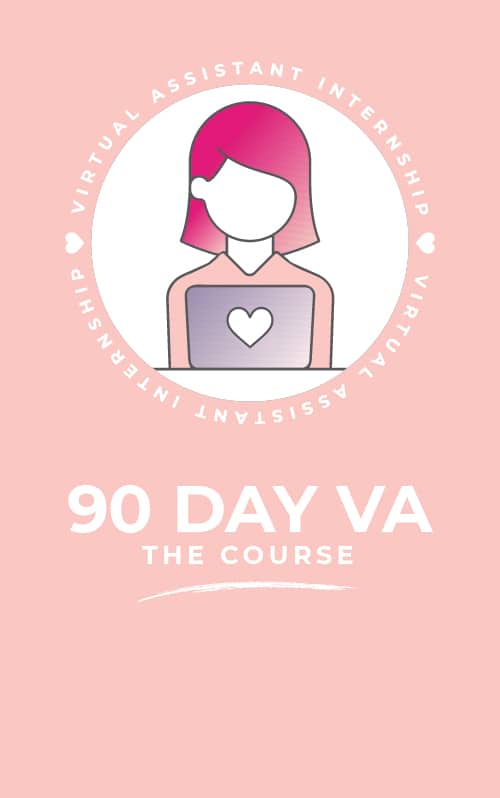Selling for yourself is scary. Many VAs have come to me stating they suck at sales and just can’t do it. Does this sound familiar to you?
A potential client located you online they reached out and you had a great consultation call. You head back to your computer and knock out a killer proposal, submit it, and wait for the reply you know is coming.
But… nothing. You follow up with an email or maybe a quick call to confirm they received the proposal. Then you wait… and wait and wait some more.
All you hear are crickets. You’ve been ghosted.
I know this can be frustrating and a big hit to your confidence. Since developing 90 Day VA, I often hear, “Esther, I had a potential client, the consultation call went great, but then they never followed through.”
Well, the problem is… okay, truth bomb: you suck at sales.
Talking about yourself too much, not listening to what the client needs, and not being able to close the deal are just some of the reasons you aren’t moving clients through from initial contact to contract.
I’ve recently talked with Renee Hribar; sales strategist, TEDx speaker, and owner of Renee Hribar International about the reasons many women find sales hard and what to do to improve their skills.
Many women struggle with imposter syndrome, the internal struggle of believing you are not what others perceive you to be. Women tend to question whether they are worth the money they should be charging, or if they are good enough to be in the position they hold.
Selling and dealing with money, especially your own product or service, can be a real struggle for some women. In 90 Day VA, we have an entire mindset series dedicated to helping women deal with self-perception and gaining confidence in themselves.
Here are 3 tips to become more confident at sales.

Tip #1: Be a Good Listener
When it comes down to it, people are people.
Everyone wants to be listened to and heard, but being a great listener is vital and takes practice. You need to hear exactly what your client is asking for because this is what they expect you to provide. Chances are, however, when they tell you what they need, it will mean something different to them than it means to you.
To be a great listener, practice the following:
- Be attentive and present
- Keep an open mind
- Listen to the words being spoken and try to picture what the speaker is saying
- Don’t interrupt or impose your solutions/ideas
You could be the best podcast editor out there, but if you don’t hear what your client expects, you’ll end up submitting a piece well below expectations and lose any credibility and referrals.
Be a great listener!
Remember this is not about you, but about the client. To build a relationship you must listen and learn how the client communicates.
The consultation call allows you to actually speak to the potential client, cutting out the chance of emails being ignored. Speaking directly to the client allows you to begin to build a relationship. After all, sales are all about relationship building.
The call or video chat will help to avoid scope creep down the road. For example; you expected the work to be a $50 job and it turns out to be closer to a $500 job. Remember to keep your consultation/interview call short (approximately 15-20 minutes) and tell them you have a hard stop at a particular time.

Tip #2: Ask Great Questions
Great salespeople ask great questions, according to Renee. After truly listening to what the client is asking for, now it’s your turn to ask great questions.
Go back over that picture the client just described to you when stating what they needed. Don’t take what they have said to heart, many people will hold information back or they may not be able to express what they need in words. It’s your job to be curious and ask the right questions.
To be able to ask the right questions you need to do some research before the call. Search Google, Youtube, Instagram, Facebook. Discover who the client is and understand their brand. Do they have a website that states their mission statement or vision?
You need to know this to understand the direction of the company. Then you can ask questions that get to the meat of what the client needs.
Avoid asking boring, vague, or stale questions that will only provide surface answers, such as, “What are you struggling with?” These will only waste time for you and the client.
Examples of questions to ask would be:
- What is the timeline you want the work to be completed? (describe exactly the work they told you)
- Have you hired anyone before to do this?
- What is your budget for the scope of work?
- What are your expectations at the job completion?
- Do you think this is a one-off project or do you have more work?
For social media, some specific questions could be:
- Why do you want to have a social media manager?
- What has worked and not worked for you in the past?
- Who is our target market?
You should rephrase the answers back to the client so they understand that you heard them and you are both clear on all points discussed. The answers to your questions will help you determine the scope and cost of the project.
As humans, we communicate all day, every day; however, we can do a pretty poor job of it much of the time.

Tip #3: Be Prepared and Take a Step Back
Renee stated there’s a process to selling, and following a process we lay out for ourselves allows us to feel good and be confident about what we are bringing to the table. You are bringing a valuable asset, one your client has come to you to discuss.
If they knew how to do what you do, they wouldn’t be talking to you. You’re the expert here.
Don’t make the discussion weird by doubting yourself or allowing your emotions to put pressure on you. Staying calm and not getting worked up about what price to quote, or if you can do the job will help you sound confident and will give the client the impression they are talking to the right person to do their job.
Don’t feel pressured to provide a price at the time of your consultation call. End the call with a statement that you will be getting the proposal together and then getting back to them within a certain amount of time. Be sure to follow through on your promised timeline, if not earlier.
Ending the call and stating you’ll follow up in the future will allow you to take the time to do any necessary research on pricing, prepare a well-organized proposal, and be ready to rock it and explain your proposal in detail to the client.
Your offer should have a time limit. At the time of presentation, state to the client that the price is effective through a particular date and that your calendar is filling up and you want to make sure they get on it now.
The secret sauce to selling yourself is being confident, being a good listener, and asking great questions, and after doing your research and being prepared, providing what the client wants.
Your expertise is valuable and worth offering. My course, 90 Day VA, goes over all the things you need to transition to work online and be confident in your skills to interview and get the right clients for you!
We discuss the consultation call, interview, and so much more to help you rock and get that paid gig! Along with learning how to interview potential clients, the course teaches step by step the top requested virtual skills asked for by online business owners.
See how you can invest in yourself and be successful. Check out my FREE masterclass here!

In 90 Day VA, Esther teaches her students how to research and repurpose current content into blogs for the VAI website. Donna is the student we’ve chosen this week to feature what she’s learned in the course. Get to know her:

Donna is a virtual assistant who helps individuals, and small business owners with social media, content development, and project management. When she’s not creating social media and blog content she loves to hike and spend time outdoors.
She’s a member of 90 Day VA and assists with everything from email/calendar to project management to make her clients’ lives easier.



